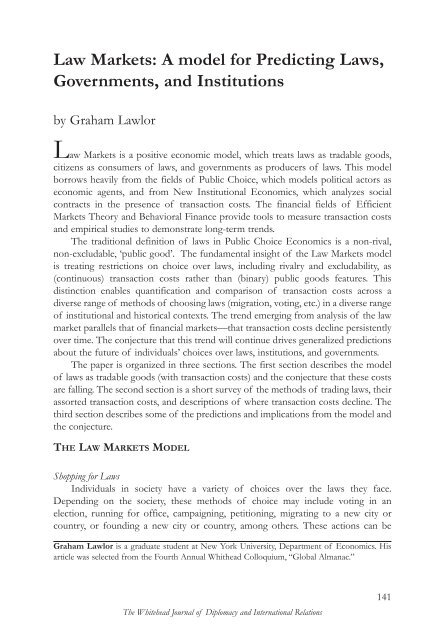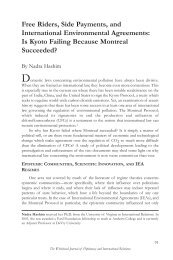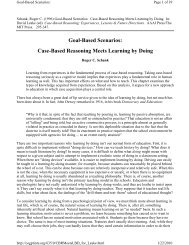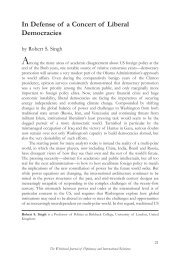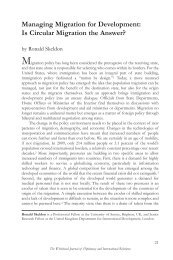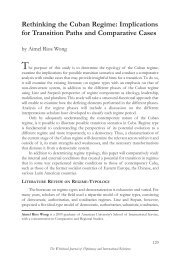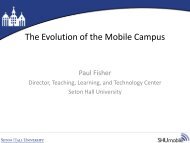Law Markets: A model for Predicting Laws, Governments, and ...
Law Markets: A model for Predicting Laws, Governments, and ...
Law Markets: A model for Predicting Laws, Governments, and ...
Create successful ePaper yourself
Turn your PDF publications into a flip-book with our unique Google optimized e-Paper software.
<strong>Law</strong> <strong>Markets</strong>: A <strong>model</strong> <strong>for</strong> <strong>Predicting</strong> <strong>Law</strong>s,<br />
<strong>Governments</strong>, <strong>and</strong> Institutions<br />
by Graham <strong>Law</strong>lor<br />
<strong>Law</strong> <strong>Markets</strong> is a positive economic <strong>model</strong>, which treats laws as tradable goods,<br />
citizens as consumers of laws, <strong>and</strong> governments as producers of laws. This <strong>model</strong><br />
borrows heavily from the fields of Public Choice, which <strong>model</strong>s political actors as<br />
economic agents, <strong>and</strong> from New Institutional Economics, which analyzes social<br />
contracts in the presence of transaction costs. The financial fields of Efficient<br />
<strong>Markets</strong> Theory <strong>and</strong> Behavioral Finance provide tools to measure transaction costs<br />
<strong>and</strong> empirical studies to demonstrate long-term trends.<br />
The traditional definition of laws in Public Choice Economics is a non-rival,<br />
non-excludable, ‘public good’. The fundamental insight of the <strong>Law</strong> <strong>Markets</strong> <strong>model</strong><br />
is treating restrictions on choice over laws, including rivalry <strong>and</strong> excludability, as<br />
(continuous) transaction costs rather than (binary) public goods features. This<br />
distinction enables quantification <strong>and</strong> comparison of transaction costs across a<br />
diverse range of methods of choosing laws (migration, voting, etc.) in a diverse range<br />
of institutional <strong>and</strong> historical contexts. The trend emerging from analysis of the law<br />
market parallels that of financial markets—that transaction costs decline persistently<br />
over time. The conjecture that this trend will continue drives generalized predictions<br />
about the future of individuals’ choices over laws, institutions, <strong>and</strong> governments.<br />
The paper is organized in three sections. The first section describes the <strong>model</strong><br />
of laws as tradable goods (with transaction costs) <strong>and</strong> the conjecture that these costs<br />
are falling. The second section is a short survey of the methods of trading laws, their<br />
assorted transaction costs, <strong>and</strong> descriptions of where transaction costs decline. The<br />
third section describes some of the predictions <strong>and</strong> implications from the <strong>model</strong> <strong>and</strong><br />
the conjecture.<br />
THE LAW MARKETS MODEL<br />
Shopping <strong>for</strong> <strong>Law</strong>s<br />
Individuals in society have a variety of choices over the laws they face.<br />
Depending on the society, these methods of choice may include voting in an<br />
election, running <strong>for</strong> office, campaigning, petitioning, migrating to a new city or<br />
country, or founding a new city or country, among others. These actions can be<br />
Graham <strong>Law</strong>lor is a graduate student at New York University, Department of Economics. His<br />
article was selected from the Fourth Annual Whithead Colloquium, “Global Almanac.”<br />
The Whitehead Journal of Diplomacy <strong>and</strong> International Relations<br />
141
142<br />
The Whitehead Journal of Diplomacy <strong>and</strong> International Relations<br />
LAWLOR<br />
thought of as types of exchange in a ‘market’ <strong>for</strong> laws. Analysis of these choices<br />
within a ‘shopping <strong>for</strong> laws’ metaphor exposes some important similarities <strong>and</strong><br />
differences between the market <strong>for</strong> laws <strong>and</strong> markets <strong>for</strong> everyday goods.<br />
When an individual votes in an election, he typically has a choice between two<br />
rival c<strong>and</strong>idates <strong>for</strong> an office. Each c<strong>and</strong>idate advocates some set of positions <strong>and</strong><br />
pledges that if elected he will act to turn these positions into law. But the voter may<br />
like some positions held by one c<strong>and</strong>idate <strong>and</strong> some held by another. Yet it is<br />
impossible <strong>for</strong> him to cast his vote in such a way that he selects a mix of the two<br />
c<strong>and</strong>idates’ positions. This situation is akin to entering a grocery store where two<br />
baskets of goods have been picked out already, leaving the shopper to select one of<br />
the two baskets rather than picking individual items off of the shelf.<br />
Another way an individual can exercise choice over his laws is through<br />
migration. Here his choice of laws is restricted by the finite set of existing countries<br />
<strong>and</strong> cities of the world to migrate to. In a shopping context, this is like a shopping<br />
mall where you can visit any store you like but you have to purchase every item they<br />
have rather than buying only a few items from each of several stores.<br />
In both voting <strong>and</strong> migration we can see the impact of restrictions related to the<br />
bundled nature of choices over laws. Clearly, having a ‘bundled’ choice is preferable<br />
to having no choice at all, but having discrete, un-bundled choices is preferable still.<br />
The bundled nature of these choices can be thought of as ‘transaction costs’ in the<br />
market <strong>for</strong> laws. The <strong>Law</strong> <strong>Markets</strong> <strong>model</strong> is essentially a process of analyzing these<br />
<strong>and</strong> other choices over laws <strong>and</strong> their associated transaction costs. The predictions<br />
of <strong>Law</strong> <strong>Markets</strong> follow from observing trends in transaction costs <strong>and</strong> anticipating<br />
these trends will continue.<br />
Overview of <strong>Law</strong> Trades<br />
The <strong>Law</strong> <strong>Markets</strong> <strong>model</strong> begins with the assumption that people have choices<br />
about their laws <strong>and</strong> all laws are the result of choice. The law market is the set of<br />
mechanisms through which people choose laws. A law is a contract that includes an<br />
exchange of rights (<strong>and</strong> possibly money <strong>and</strong> other resources) between/among<br />
parties to the law. A right is something an individual can do, that he is promising not<br />
to do, persistently, within the contract of a law.<br />
To illustrate these definitions, consider the law against theft in the context of a<br />
‘Robinson Crusoe’ world. Alone on a desert isl<strong>and</strong>, Crusoe has complete freedom to<br />
steal even though nobody has granted him permission to do so—he simply faces no<br />
restrictions on his behavior. Once a second person arrives, be<strong>for</strong>e they have made<br />
any agreements otherwise, both residents still have full freedom <strong>and</strong> may endure, <strong>for</strong><br />
some time, constantly stealing <strong>and</strong> on guard against theft. At some point, the two<br />
may determine it is in their mutual interest to limit their freedoms <strong>and</strong> may enter a<br />
contract exchanging the right to steal. The contract (law) defines the rights in the<br />
process of promising not to do the thing defined. The ‘right’ is defined in the<br />
contract by giving away (to the counterparty) something that the parties previously<br />
had the freedom to do. Rights are defined by contracts (laws)—they do not exist
LAW MARKETS<br />
outside of contracts. As with all trades, the fact that the counterparties voluntarily<br />
enter this trade implies that they each value what they get (safety from theft) more<br />
than what they gave up (the ability to steal).<br />
Categories of <strong>Law</strong> Trades<br />
The act of exchanging rights in the law market is known as a law trade. There<br />
are many methods of exchanging rights through law trades. Some broad categories<br />
are outlined below. The defining quality of a law trade is that at least one person’s<br />
rights must change as a result of the process. For example, a migrant exchanges<br />
rights with citizens of his new country, as defined in their laws. All <strong>for</strong>ms of law<br />
trade result in an exchange of rights <strong>and</strong> all exchanges of rights are law trades.<br />
Categories of <strong>Law</strong> Trades Examples<br />
1) Ad-hoc contract <strong>for</strong> rights<br />
exchange (no institution required)<br />
2) Membership change<br />
a) Of a person<br />
i)Indefinite<br />
ii)Temporary<br />
b)Of an asset<br />
3) <strong>Law</strong> change through established<br />
institutional process<br />
a) Single-step (referendum;<br />
direct democracy)<br />
b) Multi-step (representative;<br />
indirect democracy)<br />
4) Foundation of a new institution<br />
Overview of Transaction Costs in the <strong>Law</strong> Market<br />
<strong>Law</strong> <strong>Markets</strong> uses a highly generalized definition of the term ‘transaction costs.’ 1<br />
A transaction cost is “a process resulting in a cost (of resources) to one or both parties<br />
that is not benefit to either.” The term ‘cost’ here is used in the economic sense<br />
(‘opportunity cost’). 2 In this definition, costs are more than just financial (money)<br />
costs, they include time, labor/ef<strong>for</strong>t, <strong>and</strong> the ‘next best use’ <strong>for</strong> any resource offered<br />
in an exchange.<br />
For example, the transportation of goods to market is a process that is a cost of<br />
resources (time, labor/ef<strong>for</strong>t, money – opportunities). These costs are incurred by<br />
the buyer <strong>and</strong>/or seller but do not benefit either party directly—both would be just<br />
www.journalofdiplomacy.org<br />
1) Pollution rights, air rights<br />
(buildings), l<strong>and</strong>ing rights (airports)<br />
2.a.i) Immigration <strong>and</strong> naturalization<br />
2.a.ii) Tourism, study, temporaryworker<br />
2.b) Investment<br />
3.a) Voting, running <strong>for</strong> office,<br />
campaigning, donating, etc.<br />
3.b) Voting, petitioning, campaigning,<br />
etc<br />
4) Founding new city/state/country,<br />
autonomous region, secession, etc.<br />
143<br />
Summer/Fall 2008
144<br />
The Whitehead Journal of Diplomacy <strong>and</strong> International Relations<br />
LAWLOR<br />
as happy with the exchange if the other did not incur any transport costs. The goods<br />
traded away are costs to the seller, but they are not transaction costs because they are<br />
the benefit to the buyer. The payment <strong>for</strong> the goods is a cost to the buyer but is not<br />
a transaction cost because it is the benefit to the seller. In the Crusoe example, both<br />
parties give up the ‘right’ to steal from the other. The rights are not transaction costs<br />
because they are the benefits to the counterparty. However, any resources they spend<br />
negotiating, agreeing, or en<strong>for</strong>cing this law are transaction costs as they are costs that<br />
are not benefits to either party.<br />
Even in a so-called zero-transaction-cost world, transaction cost processes may<br />
never disappear, but the amount of resources they consume may be vanishingly<br />
small. For example, it may continue to be necessary to speak with a counterparty to<br />
get his consent <strong>for</strong> a trade, even if the cost of the phone call approaches zero over<br />
time.<br />
Transaction costs are categorized according to the time at which they occur<br />
during the exchange process. Search costs occur be<strong>for</strong>e the parties have found each<br />
other <strong>and</strong> agreed on the deal. Clearing costs occur between the time the deal is<br />
agreed <strong>and</strong> when it is executed. Maintenance costs occur after the execution. The<br />
categorization of transaction costs is substantially similar to definitions used in<br />
Transaction Cost Economics literature. 3<br />
Transaction Cost Processes Examples<br />
1) Search - Finding the deal (preconsent,<br />
pre-delivery)<br />
2) Clearing (negotiation)- Executing<br />
the deal (post-consent, pre-delivery,<br />
one-time)<br />
3) Maintenance (en<strong>for</strong>cement)-<br />
Persistent transaction activities (postconsent,<br />
post-clearing, ongoing)<br />
Research, marketing, negotiation <strong>and</strong><br />
bargaining (including price),<br />
coordination<br />
Transportation, processing,<br />
commission (paid to 3rd party agents),<br />
taxation, policing/en<strong>for</strong>cement (onetime<br />
activities)<br />
Exclusion (of free-riders),<br />
policing/en<strong>for</strong>cement (ongoing<br />
activities), legal opportunity cost<br />
(bundling of provisions in a bill, issues<br />
in a c<strong>and</strong>idate, laws in an institution,<br />
positions in a party, etc.), lifestyle<br />
opportunity cost (bundling of laws<br />
with a geographical location -<br />
proximity to friends, family, home, job,<br />
language, culture, etc.)
LAW MARKETS<br />
Several of the resources consumed by transaction cost processes in the law<br />
market are the same as those of concern in other markets—money, labor, <strong>and</strong> time.<br />
These costs are straight<strong>for</strong>ward because they are easily quantifiable <strong>and</strong> directionally<br />
uni<strong>for</strong>m (everyone wants more time, money, <strong>and</strong> leisure). Other important resources<br />
of concern in the law market are legal opportunity cost (laws given up), <strong>and</strong> lifestyle<br />
opportunity cost (lifestyle aspects given up). These are harder to quantify <strong>and</strong> may<br />
not be directionally uni<strong>for</strong>m (i.e. one emigrant may gain utility by escaping a<br />
particular law, whereas another emigrant may lose utility escaping the same law).<br />
Another important difference between transaction costs <strong>for</strong> laws <strong>and</strong><br />
transaction costs <strong>for</strong> traditional goods involves the persistent nature of the exchange<br />
of rights. <strong>Law</strong>s are a promise not to do something <strong>for</strong> a particular (often indefinite)<br />
length of time. <strong>Law</strong>s, there<strong>for</strong>e, usually contain provisions to monitor <strong>and</strong> en<strong>for</strong>ce<br />
these promises. These provisions often imply significant, ongoing maintenance costs<br />
to the counterparties of the law trade (police, courts, jails, etc.).<br />
Quantification of Transaction Costs<br />
The predictions of <strong>Law</strong> <strong>Markets</strong> theory follow from the conjecture that<br />
transaction costs in the market <strong>for</strong> laws are experiencing a persistent, secular decline.<br />
In order to show this trend, we must quantify the total resource cost <strong>for</strong> law market<br />
transactions <strong>and</strong> observe trends over time. There are broadly two ways of<br />
approaching this problem: 1) by enumerating the processes that incur transaction<br />
costs <strong>and</strong> tracking them <strong>and</strong> 2) by seeking a single statistic that comprehensively<br />
encapsulates all transaction costs <strong>and</strong> tracking it. Because only the comprehensive<br />
approach can provide unambiguous trends, we will cover the second approach first.<br />
Since the law market is a one-sided market, the comprehensive approach cannot be<br />
applied directly, so we describe the enumerative approach as well.<br />
QUANTIFYING TRANSACTION COSTS IN TWO-SIDED MARKETS<br />
Many securities markets (stocks, bonds, currencies…) have a property that<br />
distinguishes them from goods <strong>and</strong> service markets—they are ‘two-sided’. Certain<br />
agents in two-sided markets, called ‘market makers’, profit from constantly buying<br />
<strong>and</strong> selling the same security throughout the day. They maintain a small difference<br />
between the (lower) price they buy <strong>and</strong> the (higher) price at which they sell. This<br />
difference is called the ‘spread’ <strong>and</strong> the market maker adjusts the position <strong>and</strong><br />
magnitude of this spread throughout the day, depending on supply <strong>and</strong> dem<strong>and</strong> <strong>for</strong><br />
the security. A large spread implies high profits <strong>for</strong> the market maker, though<br />
competition among market makers keeps these spreads low. Typically, the market<br />
maker has no particular view on the ‘correct’ price of the security, <strong>and</strong> there<strong>for</strong>e<br />
avoids maintaining a large position (long or short) at any time.<br />
The two-sided property of these markets creates the conditions necessary to<br />
comprehensively observe transaction costs in a market. All market maker’s revenues<br />
are generated by the spread, <strong>and</strong> there<strong>for</strong>e all his costs (exchange membership dues,<br />
marketing, running his computers, taxes, overhead, etc.) are funded by the spread. By<br />
www.journalofdiplomacy.org<br />
145<br />
Summer/Fall 2008
146<br />
The Whitehead Journal of Diplomacy <strong>and</strong> International Relations<br />
LAWLOR<br />
looking at the spread we have an accurate <strong>and</strong> comprehensive measure of transaction<br />
costs. No matter what his costs are or whether we can enumerate or estimate them<br />
individually, they must always be included in the spread as long as he stays in<br />
business. Also, we have a very long historical record of spreads <strong>for</strong> certain securities<br />
markets, providing good data <strong>for</strong> long term trend analysis. The graphs below show a<br />
100-year survey of stock prices <strong>and</strong> brokerage commissions <strong>for</strong> the stocks in the<br />
Dow Jones Industrial Average from 1900-2000 4 showing generally falling transaction<br />
costs.<br />
FIGURE 1: BID-ASK SPREADS ON DOW JONES STOCKS 5<br />
QUANTIFYING TRANSACTION COSTS IN ONE-SIDED MARKETS<br />
Outside of securities markets, there is usually no equivalent of a ‘market maker’<br />
who buys <strong>and</strong> sells the same goods in the same market. For example, retail customers<br />
cannot generally sell a meal to a restaurant, or sell a computer to Best Buy. Since there<br />
is no single agent who both buys <strong>and</strong> sells, there is no notion of ‘spread’. To observe<br />
transaction costs in one-sided markets, we attempt to enumerate the various<br />
processes that incur transaction costs <strong>and</strong> attempt to detect trends in the resource<br />
costs of those processes. Fortunately, many transaction cost processes are common<br />
across a wide variety of markets (including law markets)—transportation,<br />
in<strong>for</strong>mation, communication, etc. The advantage in this enumerative approach is that<br />
it can be applied to any market, not just two-sided markets. The disadvantage is that<br />
no matter how carefully we enumerate the various processes <strong>and</strong> estimate their<br />
resource cost, we can never be sure we have been comprehensive. Although this<br />
approach is necessarily anecdotal, some compelling trends emerge that com<strong>for</strong>t us in<br />
the conjecture that transaction costs are broadly declining over time.
LAW MARKETS<br />
TRANSPORTATION 6<br />
COMMUNICATION 7<br />
www.journalofdiplomacy.org<br />
147<br />
Summer/Fall 2008
148<br />
INFORMATION 8<br />
The Whitehead Journal of Diplomacy <strong>and</strong> International Relations<br />
LAWLOR<br />
The Efficient <strong>Markets</strong> Conjecture<br />
Trends observed in both approaches lead us to a highly generalized conjecture,<br />
which, when applied to the market <strong>for</strong> laws, drives the predictions of <strong>Law</strong> <strong>Markets</strong><br />
theory. This general conjecture, the Efficient <strong>Markets</strong> Conjecture states that: <strong>for</strong> any<br />
given good, per-unit transaction costs will fall over time, asymptotically approaching zero.<br />
As the name suggests, this statement is a conjecture, <strong>and</strong> I do not attempt a<br />
proof.. Transaction cost research, like that cited above, though by no means<br />
comprehensive, provides some evidence. Literature in Endogenous Growth Theory 9<br />
provides additional theoretical <strong>and</strong> empirical basis <strong>for</strong> the conjecture in a highly<br />
generalized, economy-wide case. In the limited survey below, I will provide more<br />
(anecdotal) evidence <strong>for</strong> falling transaction costs specific to the law market. To the<br />
extent these anecdotes are enough to convince the reader of the trend, they lead to<br />
some compelling implications.<br />
There are several important clarifications to make about this conjecture. First, it<br />
is important to make the distinction between falling transaction costs <strong>and</strong> falling<br />
costs. In the graphs above showing trends in the stock market, <strong>for</strong> example, we can<br />
easily observe that the cost of trading a share of stock is falling over time However,<br />
in no way does this imply that the price of the shares themselves are falling (in fact<br />
they have risen significantly). In law markets the value of the law itself (say the value<br />
of Delaware’s corporate governance law to a particular company) may rise, even<br />
while the cost of choosing the law (the cost of incorporating there) falls.<br />
Secondly, it is important to note that we are looking <strong>for</strong> a decline in per-unit
LAW MARKETS<br />
transaction costs, not a decline in transaction costs across the entire economy, or<br />
even across an entire market. All the predictions <strong>and</strong> implications below rely only on<br />
per-unit analysis. Indeed, the total amount spent on transaction costs (spread plus<br />
commission) in the stock market has risen significantly, while per-unit costs have<br />
fallen dramatically. Any fixed transaction cost spread over an increasing volume of<br />
transactions will result in falling per-unit transaction costs through economies of<br />
scale.<br />
SURVEY OF TRANSACTION COSTS IN THE LAW MARKET<br />
In order to drive predictions from the Efficient <strong>Markets</strong> Conjecture, we must<br />
observe declining transaction cost12s—not just in a prototypical market, but also in<br />
the particular mechanisms of the law market. As noted, many of the transaction<br />
costs in markets <strong>for</strong> goods <strong>and</strong> services apply to the law market as well. The falling<br />
cost of transportation makes immigration—as well as trade in oranges <strong>and</strong> iPods—<br />
much easier. The falling cost of in<strong>for</strong>mation <strong>and</strong> communication makes<br />
coordination in the democratic process—as well as trade in furniture <strong>and</strong> real<br />
estate—much easier. ome of the most significant transaction costs in the law<br />
market—‘legal’ <strong>and</strong> ‘lifestyle opportunity costs’— are where we can see some of the<br />
most dramatic declines <strong>and</strong> greatest evidence of the effects.<br />
The survey in this section provides a more thorough view of how <strong>and</strong> where<br />
transaction costs are falling in each of the defined categories of law trades. North<br />
(1990, 1994) gives several treatments of causes <strong>and</strong> (persistently declining) trends in<br />
legal transaction costs over very long time horizons. Causes of declining transaction<br />
costs, North says, include ‘social learning’, ‘institutional <strong>and</strong> economic change’, <strong>and</strong><br />
‘technological <strong>and</strong> institutional change.’ 10 The phenomena described in this survey<br />
are examples of these causes. For brevity’s sake, we include examples from only<br />
categories two (Membership Change), three (Established Institutional Process) <strong>and</strong><br />
four (Foundation of a New Institution).<br />
Category Two: Membership Change<br />
A membership change is a law trade in which the desired law already exists<br />
within some institution (city, state, country, etc.) <strong>and</strong> the joining member becomes<br />
party to the law, thereby exchanging rights with existing members. Both temporary<br />
(tourists, international students, guest workers, <strong>and</strong> refugees) <strong>and</strong> permanent<br />
membership changes (immigrants) are everyday occurrences <strong>and</strong> a primary way<br />
people choose their laws. Hirschman (1970) <strong>and</strong> Ashby (2007) provide theoretical<br />
<strong>and</strong> empirical justification <strong>for</strong> migration towards better laws. 11<br />
Legal drivers <strong>for</strong> migration are both direct <strong>and</strong> indirect. If the destination<br />
country has better economic opportunities <strong>for</strong> a migrant than the origin country, <strong>and</strong><br />
if these opportunities are the result of better laws or better government, then<br />
migration is driven by indirect legal causes. Some direct legal drivers <strong>for</strong> (temporary<br />
or permanent) international migration include:<br />
Abortion (banned in Chile, Nicaragua, El Salvador, most of Africa <strong>and</strong> the<br />
middle-East)<br />
www.journalofdiplomacy.org<br />
149<br />
Summer/Fall 2008
150<br />
The Whitehead Journal of Diplomacy <strong>and</strong> International Relations<br />
LAWLOR<br />
Religious restrictions on marriage (Saudi Arabia, Iran, Israel)<br />
Same-sex marriage (banned everywhere except The Netherl<strong>and</strong>s, Belgium,<br />
Canada, South Africa, Spain, Massachusetts, <strong>and</strong> Cali<strong>for</strong>nia)<br />
Religious, political, ideological, persecution, intolerance<br />
The notion of changing the membership of one’s assets is an important subclass of<br />
this category of law trade. If I physically reside in one country but some of my assets<br />
(investments, capitol goods, etc.) reside in another country, then these assets are at<br />
least partially subject to laws in that country. We can see many examples of<br />
international investment flows following (positive or negative) changes in laws. One<br />
of the best illustrations of this recently is the dramatic uptick in investment seen in<br />
countries set to join the European Union. In addition, people routinely move virtual<br />
assets, such as censored blogs, online casinos, <strong>and</strong> websites towards permissive<br />
jurisdictions. Other common instances of legally-driven asset migration include tax<br />
havens, international stock listings, or simply investment in multinational<br />
corporations that have exposure to a particular <strong>for</strong>eign country, its laws <strong>and</strong> its<br />
economy. Finally, many of these drivers (temporary <strong>and</strong> permanent, direct <strong>and</strong><br />
indirect, moving assets or moving the person) exist within national borders as well as<br />
across them. There is a large volume of people crossing city, country or state lines<br />
to gamble, drink, work, or setup a company on any given day.<br />
The following is a brief description of some declining trends in transaction<br />
costs in the membership change (migration) category of law trade, organized by category<br />
of transaction cost (Search, Clearing, <strong>and</strong> Maintenance).<br />
Search costs, as noted above, are costs associated with the parties to the trade<br />
finding each other, prior to agreeing to the exchange.<br />
Declining trends in Search costs:<br />
The Internet. Declining search costs associated with the development of the<br />
internet include costs of finding in<strong>for</strong>mation about: how to migrate, visit,<br />
study, or work in another country; what the laws, economy, opportunities in<br />
other countries; identifying <strong>and</strong> communicating with agents to assist in<br />
immigration (immigration attorneys, travel agencies, schools, scholarship<br />
administrators, employers, etc.).<br />
Financial Services Deregulation/Innovation (asset migration). Declining search<br />
costs in this area include ever-increasing options <strong>for</strong> <strong>for</strong>eign investing<br />
(American Depository Receipts (ADR’s), mutual funds that invest in<br />
overseas firms, domestic brokerages with direct access to <strong>for</strong>eign stock<br />
exchanges, domestically-based companies with international operations,<br />
etc.)<br />
Clearing costs, as noted above, are costs associated with executing the transaction,<br />
after the parties have found each other <strong>and</strong> agreed on the exchange.<br />
Declining trends in Clearing costs:<br />
Transportation. Broad, secular declines can be seen in the cost of most modes
LAW MARKETS<br />
of transportation, due to technology, competition, deregulation, <strong>and</strong><br />
economies of scale. In general, travel is easier <strong>and</strong> cheaper than it has been<br />
at any time in history.<br />
Maintenance costs, as noted above, are costs associated with en<strong>for</strong>cing the terms of<br />
the trade, after the exchange has been executed<br />
Declining trends in Maintenance costs:<br />
The Internet. People are increasingly able to per<strong>for</strong>m their jobs remotely, via the<br />
Internet. The ability to separate or de-bundle legal environments (countries)<br />
addresses two of the biggest transaction costs associated with migration:<br />
legal <strong>and</strong> lifestyle opportunity costs. This trend is increasingly broad,<br />
affecting a diverse array of professions <strong>and</strong> income levels worldwide.<br />
Communication. It is continually cheaper <strong>and</strong> easier to remain in contact with<br />
people (friends, family, colleagues) through a proliferating range of media.<br />
This also has a major impact on the ‘lifestyle opportunity cost’ associated<br />
with travel <strong>and</strong> migration.<br />
Globalization. Costs associated with learning a new language, culture, <strong>and</strong><br />
customs in order to enjoy a different set of laws are continually falling. A<br />
few global languages are increasingly ubiquitous <strong>and</strong> people everywhere are<br />
more culturally aware.<br />
Category Three: Established Institutional Process<br />
Institutions generally have processes, established in their charters or<br />
constitutions, that allow <strong>for</strong> changes to the laws of the institution. The details of<br />
these processes vary widely from government to government <strong>and</strong> by the type of<br />
institution (city/state/federal, democracy/kingdom/dictatorship, single-party/multiparty,<br />
parliamentary/presidential).<br />
Some major declining trends in transaction costs are:<br />
The Trend towards democracy. The broad trend away from autocracy <strong>and</strong><br />
towards democracy in the world’s governments is well established (see<br />
graph, Freedom House 2006). This phenomenon represents a major<br />
reduction in transaction costs in itself, as democracy is fundamentally a<br />
method through which people exercise choice over their laws. Choice over<br />
laws exists outside of democracy (e.g. petitioning, joining the ruling party,<br />
etc.) but success is much less likely <strong>and</strong> costs of failure higher.<br />
www.journalofdiplomacy.org<br />
151<br />
Summer/Fall 2008
152<br />
The Whitehead Journal of Diplomacy <strong>and</strong> International Relations<br />
LAWLOR<br />
FIGURE 4: FREEDOM IN HE WORLD 1972-2005 COUNTRY RANKINGS 12<br />
Privatization. In many countries, the government owns major industrial<br />
operations. These operations often consume large resources in the <strong>for</strong>m of<br />
tax subsidies, privileged access <strong>and</strong> eminent domain rights. Citizens do have<br />
some choice over how these resources are used, but this choice is executed<br />
through the institutional process (voting, etc.). Institutional processes may<br />
or may not be democratic <strong>and</strong> nearly always have higher transaction costs<br />
than an equivalent private process. When governments privatize industrial<br />
holdings they are taking steps to break up the ‘basket of laws’ described<br />
earlier. Be<strong>for</strong>e a privatization, decisions over the industrial investment <strong>and</strong><br />
decisions over laws are bundled. After privatization, these decisions can be<br />
made discreetly <strong>and</strong> independently. The table 13 demonstrates the global<br />
privatization trend:<br />
CHANGE IN STATE OWNED ENTERPRISE’S ACTIVITY AS A PERCENTAGE<br />
OF GDP— DECREASE IN PERCENTAGE POINTS OF GDP—<br />
The following is a brief description of some declining trends in transaction costs in<br />
the established institutional process category of law trade (democracy, dictatorship,<br />
or other system of government), organized by category of transaction cost (Search,<br />
Clearing, <strong>and</strong> Maintenance).<br />
Declining trends in Search costs:<br />
Coordination. Coordination is the ability <strong>for</strong> citizens to underst<strong>and</strong> which laws,<br />
policies, <strong>and</strong> leaders others support. Since coordination takes place be<strong>for</strong>e<br />
the trade is executed (be<strong>for</strong>e the vote) it is considered a Search cost.<br />
Developments in various technologies make coordination much easier <strong>and</strong>
LAW MARKETS<br />
have increasing political impact in countries at every level of<br />
democratization.<br />
Countries<br />
(by Income Group) 1980 1999 Change<br />
Low income<br />
countries<br />
Middle income<br />
countires<br />
Upper middle<br />
income countries<br />
High income<br />
countries<br />
The Internet. In democracies, the internet dramatically reduces certain costs<br />
related to coordination of opinions within the electorate— <strong>for</strong> example,<br />
c<strong>and</strong>idate websites, pundit blogs, research distribution from think-tanks,<br />
newspaper websites, video sharing websites (YouTube, etc.), social<br />
networks, email, instant messaging, chat rooms, etc. In nondemocracies, the<br />
Internet enables dissident blogs, ‘people-power’ revolutions, <strong>and</strong> exposes<br />
corruption.<br />
Other Technology. Proliferation <strong>and</strong> personalization of recording devices<br />
(cameras, video cameras, microphones, etc.) media distribution channels<br />
(cable, satellite, Internet, podcasts, mobile <strong>and</strong> wireless networks, etc.) <strong>and</strong><br />
viewing devices (computer, mobile phone, etc.). Mobile phones <strong>and</strong> text<br />
messaging enable <strong>and</strong> reduce the cost of coordinating campaigns <strong>and</strong><br />
volunteers.<br />
Declining trends in Maintenance costs:<br />
En<strong>for</strong>cement. En<strong>for</strong>cement technologies are undergoing considerable steady<br />
innovation. Continual improvements are observed in <strong>for</strong>ensic techniques<br />
such as fingerprinting, DNA testing, etc.; monitoring technologies such as<br />
GPS, ankle bracelets, LoJack, etc. These trends reduce the costs of<br />
operating the en<strong>for</strong>cement mechanisms <strong>and</strong> the likelihood of (costly)<br />
en<strong>for</strong>cement errors.<br />
Category Four: Foundation of a New Institution<br />
Since 2000, three new countries (East Timor, Montenegro, <strong>and</strong> Kosovo) have<br />
emerged; in the last ten years at least thirty-four countries have written new<br />
constitutions. 14 The foundation of new cities, states, autonomous regions, <strong>and</strong><br />
private institutions make this a significant method of law trade. The following is a<br />
brief description of some declining trends in transaction costs in the foundation of<br />
www.journalofdiplomacy.org<br />
15 2.5 -12.5<br />
11.0 4.0 -7.0<br />
10.5 4.0 -6.5<br />
6.0 4.0 -2.0<br />
153<br />
Summer/Fall 2008
154<br />
The Whitehead Journal of Diplomacy <strong>and</strong> International Relations<br />
LAWLOR<br />
a new institution category of law trade, organized by category of transaction cost<br />
(Clearing, <strong>and</strong> Maintenance).<br />
Declining trends in Clearing costs:<br />
Global Perceptions. The principle that people have the right of selfdetermination<br />
is reflected in article one of both the International Covenant<br />
on Civil <strong>and</strong> Political Rights 15 (ICCPR) <strong>and</strong> the International Covenant on<br />
Economic, Social <strong>and</strong> Cultural Rights 16 (ICESCR). To the (increasing)<br />
extent that such principles are acknowledged <strong>and</strong> honored, it is becoming<br />
easier <strong>for</strong> groups to create new sovereign nations <strong>and</strong> autonomous regions.<br />
The Internet. As discussed above, the Internet is perpetually evolving as a tool<br />
<strong>for</strong> communication <strong>and</strong> coordination in the law market. Since foundation of<br />
a new nation is not a daily occurrence, each example demonstrates new uses<br />
<strong>for</strong> the Internet. The three successful independence movements so far this<br />
century had access to coordination-enhancing capabilities of the Internet<br />
such as email, blogs, social networks, <strong>and</strong> Internet video/audio/photo<br />
dissemination. For example, Internet-distributed recordings of militia<br />
violence, arson, <strong>and</strong> looting accelerated the international response in East<br />
Timor, culminating in an armed UN security mission <strong>and</strong> various<br />
international assistance <strong>and</strong> finance programs <strong>for</strong> the new nation. Both<br />
Montenegro <strong>and</strong> Kosovo’s independences from Serbia were closely<br />
monitored by regional <strong>and</strong> international missions <strong>and</strong> were generally free of<br />
violence (particularly so in contrast to secession movements throughout<br />
history). Internet distribution of news <strong>and</strong> reports from other<br />
contemporary revolutionary/secessionary crises (Myanmar, Darfur/Sudan,<br />
Tibet, Chechnya, Kenya, Pakistan, Zimbabwe) provide increasing avenues<br />
<strong>for</strong> dissemination of news <strong>and</strong> corresponding coordination of local <strong>and</strong><br />
international reaction.<br />
Other Technology. Proliferation of digital media recording devices (cameras,<br />
video cameras, audio devices, mobile phones, etc.), particularly in<br />
conjunction with the Internet as a distribution mechanism have incredible<br />
coordination power, both inside the country <strong>and</strong> internationally.<br />
Declining trends in Maintenance costs:<br />
Experience <strong>and</strong> International Assistance. New nations are increasingly seen as<br />
worthy <strong>and</strong> welfare-enhancing enterprises by the international community.<br />
To a great extent we can see established nations assisting new nations with<br />
peacekeeping, with the writing of their constitutions, <strong>and</strong> with financing<br />
critical services <strong>and</strong> infrastructure. At previous points in history, small,<br />
vulnerable new countries were quickly overrun by big neighbors—an<br />
outcome that is increasingly rare. To this extent, founders of new nations<br />
are able to reduce the transaction costs associated with these maintenance<br />
processes <strong>and</strong> more easily establish their new institution.
LAW MARKETS<br />
Substitution among Methods <strong>and</strong> Market-Wide Trends<br />
The <strong>for</strong>egoing survey attempted to show some of the reasons to believe that<br />
transaction costs associated with an individual’s choices over laws are declining.<br />
Treating these methods of law choice, together, as elements of a market, rather than<br />
a set of individual phenomena, has some interesting properties.<br />
The methods of law choice are substitutes <strong>for</strong> one another. If my personal<br />
security is threatened I can enter an ad-hoc contract with my neighbors (a<br />
neighborhood watch association), or I can migrate to a safer town, or use my vote to<br />
put more police on the streets (institutional process), or I can found a new town. Any<br />
law can, in principle, be enacted by any of the methods outlined above. As with all<br />
substitutes, phenomena in one market affect the others. Some examples include:<br />
Mass exodus from East Germany (migration) drove democratic re<strong>for</strong>ms <strong>and</strong><br />
reunification (institutional process, new institution)<br />
A stable democracy <strong>and</strong> its prosperity (new institution) drove immigration to<br />
America<br />
Threat of secession (new institution) drove autonomy <strong>and</strong> institutional re<strong>for</strong>ms<br />
in Quebec, Scotl<strong>and</strong>, <strong>and</strong> Basque Spain (institutional process)<br />
Legislation supporting stem cell research (institutional process) in Singapore<br />
drove research investment <strong>and</strong> migration of scientists (asset <strong>and</strong> personal migration)<br />
It is through this substitution among the law trade processes that we can expect (<strong>and</strong><br />
observe) general, market-wide trends in falling transaction costs. It is through this<br />
substitution that we expect the self-rein<strong>for</strong>cing, ‘endogenous’ nature of the trend to<br />
manifest – better technology produces better laws <strong>and</strong> better laws produce better<br />
technology.<br />
This survey has provided some law-market specific examples of declining<br />
secular trends in transaction costs. Though not a proof, these examples supplement<br />
evidence referenced earlier from other fields—financial economics <strong>and</strong> exogenous<br />
growth theory. To the extent this is convincing of the general trend, we are ready to<br />
look at some predictions.<br />
PREDICTIONS AND IMPLICATIONS<br />
Declining Resource Consumption per <strong>Law</strong> Trade<br />
The first set of predictions is a restatement of the <strong>Law</strong> <strong>Markets</strong> thesis (that<br />
transaction costs in the law market are declining), but in a different <strong>for</strong>m. Rather than<br />
looking at each method of trading laws <strong>and</strong> observing where costs are falling, these<br />
predictions look at each resource consumed in the transaction process <strong>and</strong> predict<br />
they will decline. These predictions are generally qualitative rather than quantitative<br />
<strong>and</strong> the confirming evidence, where it exists, is anecdotal rather than comprehensive.<br />
Both of these deficiencies could be remedied with statistical analysis, in principle.<br />
Time Cost: Increasing Speed of Execution<br />
Trades arise from the potential of mutual benefit among counterparties. The<br />
www.journalofdiplomacy.org<br />
155<br />
Summer/Fall 2008
156<br />
The Whitehead Journal of Diplomacy <strong>and</strong> International Relations<br />
LAWLOR<br />
elapsed time from when the potential arises to when the benefit is realized is a<br />
transaction cost. The parties to a transaction would like to complete the trade as<br />
quickly as possible so they can enjoy the benefit as soon as possible. The (discounted)<br />
present value of the benefit of the trade declines the longer it takes to execute the<br />
trade.<br />
Stock prices were once published daily in the Wall Street Journal <strong>and</strong> trading<br />
happened through a broker over the phone. Today, stock prices are published with a<br />
fifteen-minute delay <strong>and</strong> trading happens over the Internet in a few seconds. Goods<br />
markets see increasing speed of execution through overnight delivery, just in time<br />
manufacturing, <strong>and</strong> globally integrated distribution channels.<br />
Increasing speed of execution in laws implies faster realization of all methods<br />
of trade. There are significant delays inherent in each of the methods of law trade.<br />
From the point a group recognizes the potential mutual benefit, execution of the<br />
trade (through migration, representative voting, founding a new government, etc.)<br />
may take years, rather than seconds, to execute. As markets become efficient, this<br />
delay will decrease. At the point the law market is as efficient as the stock market, law<br />
trades will be executed on the order of seconds. Indeed, it is already possible to move<br />
many types of assets from one legal regimen to another within these timeframes.<br />
Opportunity Cost: Discrete Choices<br />
This paper has discussed the ‘bundled’ nature of laws (bundles of provisions),<br />
votes (bundles of endorsements), <strong>and</strong> citizenship (bundles of laws) in some detail.<br />
Financial engineering is the process of de-bundling risks <strong>and</strong> cash flows in securities<br />
markets. Examples include short selling, options, bond strips, swaps, ADR’s, <strong>and</strong> all<br />
<strong>for</strong>ms of derivatives. Similar engineering is possible, <strong>and</strong> even precedented, in the<br />
law market.<br />
A vote in a representative democracy is a large bundle of endorsements. Fully<br />
de-bundling the vote implies voting <strong>for</strong> each measure independently, as in a direct<br />
democracy, something that technology <strong>and</strong> the Internet increasingly enable. The<br />
‘Senator On-Line’ project in Australia, <strong>for</strong> example, de-bundles the endorsements of<br />
a vote <strong>for</strong> Senator. A ‘dummy’ c<strong>and</strong>idate runs <strong>for</strong> office in the real election. If he is<br />
elected, all bills are posted online where citizens vote <strong>for</strong> them directly. The opinion<br />
resulting is passed to the ‘dummy’ c<strong>and</strong>idate in the real legislature. This effectively<br />
turns every bill into a referendum <strong>and</strong> eliminates the ‘basket’ effects of representative<br />
democracy. A further step is de-bundling bills, which are themselves large bundles of<br />
individual provisions (each of which may or may not be endorsed by a given citizen).<br />
With increasing ‘financial engineering’, individuals will be able to select just those<br />
provisions they prefer <strong>and</strong> leave the rest.<br />
Citizenship combines membership in a bundle of laws <strong>and</strong> access to a physical<br />
territory. Fully de-bundling citizenship implies people would be able to select laws<br />
from particular cities, states, countries—<strong>and</strong> physical access to territories—<br />
individually. Some of this is possible today, through migration, tourism, international<br />
trade, <strong>and</strong> multiple-citizenship. Privatization <strong>and</strong> globalization allow people to
LAW MARKETS<br />
choose laws <strong>for</strong> themselves <strong>and</strong> their assets increasingly independently. As<br />
transaction costs fall, all of these choices will be increasingly discrete.<br />
In<strong>for</strong>mation Cost: Transparency <strong>and</strong> Prices<br />
Search, the acquisition of in<strong>for</strong>mation about a trade in advance of execution, is<br />
a costly process—costly in time, money, labor <strong>and</strong> opportunities. The term<br />
‘transparency’ describes the availability of in<strong>for</strong>mation <strong>and</strong> the cost of acquiring it.<br />
In efficient markets, search cost is minimized through the existence of prices. It is<br />
through prices that consumers <strong>and</strong> producers can quickly <strong>and</strong> easily observe the<br />
precise opportunity costs <strong>and</strong> benefits of goods. Buyers <strong>and</strong> sellers are able to<br />
compare, budget, <strong>and</strong> negotiate transactions only to the extent they have an objective<br />
view of the offers available to them: the prices of goods on the market. Lack of<br />
prices (lack of transparency into the opportunity cost of an item) is a tremendous<br />
barrier to exchange. In the absence of prices, most exchange simply halts or occurs<br />
in black markets. Currently, there are only limited examples of prices in the market<br />
<strong>for</strong> laws.<br />
There exist both legal <strong>and</strong> black-market prices <strong>for</strong> citizenship. Most countries,<br />
including the U.S., have the notion of an ‘investor visa’, whereby anyone in the world<br />
can become a legal resident (<strong>and</strong> eventually a citizen) if he invests enough money in<br />
the country. Many skilled workers migrate each year on sponsored work visas (H1-B<br />
in the U.S.). Several countries (Germany, Singapore) have ‘guest worker’ programs<br />
<strong>for</strong> low-skilled workers, with associated costs. Such programs exist because of<br />
economic pressures—countries drop these programs at the risk of their global<br />
competitiveness. Costs incurred by firms <strong>and</strong> workers who participate in these<br />
programs are effectively legal prices <strong>for</strong> citizenship/residency. Where there is the<br />
potential <strong>for</strong> gains from trade but no legal avenue, there is a black market <strong>for</strong><br />
residency. Prices <strong>for</strong> illegal migration (smuggling) are also quoted widely.<br />
There are also legal <strong>and</strong> black-market prices <strong>for</strong> votes. Elected representatives<br />
exist as agents to facilitate the exchange of rights among citizens, so money<br />
transferred between representatives <strong>and</strong> their constituencies in either direction<br />
constitute prices <strong>for</strong> votes. Legal examples of representatives ‘buying’ votes from<br />
constituencies include earmarks, ‘pork-barrel’ projects, <strong>and</strong> patronage. Legal <strong>for</strong>ms<br />
of individuals ‘buying’ votes from representatives include campaigning (donating,<br />
volunteering, organizing, 527 groups) <strong>and</strong> lobbying. Representatives ‘buy’ votes from<br />
each other through logrolling. As with migration, these exchanges (<strong>and</strong> associated<br />
prices) exist because of economic pressures. Again, where the potential <strong>for</strong> gains<br />
from trade exists but no legal avenue a black market emerges (with its own prices <strong>and</strong><br />
transaction costs).<br />
As with all other markets, as transaction costs fall, prices can be expected to<br />
become increasingly transparent. In the representative process, votes will have prices<br />
<strong>and</strong>, as votes become de-bundled, votes <strong>for</strong> individual bills, <strong>and</strong> eventually provisions<br />
within bills, will have transparent prices. In the migration process, citizenship,<br />
residency permits, <strong>and</strong> all <strong>for</strong>ms of visas will have prices (<strong>and</strong> in de-bundled <strong>for</strong>m).<br />
www.journalofdiplomacy.org<br />
157<br />
Summer/Fall 2008
158<br />
The Whitehead Journal of Diplomacy <strong>and</strong> International Relations<br />
LAWLOR<br />
As with goods, services, labor, <strong>and</strong> securities, the prices of laws will be determined<br />
dynamically by supply <strong>and</strong> dem<strong>and</strong>.<br />
Rising Transaction Volume in <strong>Law</strong> Trades<br />
As transaction costs in a market fall, the volume of transactions in that market<br />
tends to rise. We can predict this theoretically, through simple partial equilibrium<br />
analysis, <strong>and</strong> we can observe this empirically in a wide variety of markets. The<br />
volume of shares traded on the NYSE has risen from an average of 3 million shares<br />
per day in 1960 to 1.6 billion shares in 2005. 17 We can expect to see greater volumes<br />
of transactions in the law market, such as:<br />
More ad-hoc contracts<br />
More immigration (long-term international migrants have increased from 75<br />
million in 1965 to 150 million in 2000) 18<br />
More laws (<strong>and</strong> de-bundling of bills into higher volume discreet subcomponents)<br />
More countries (countries in the world have increased from 57 in 1900 to 192 in<br />
2000) 19<br />
More autonomous regions (Nunavut, Basque, Catalonia, Scotl<strong>and</strong>, Kurdish Iraq,<br />
West Bank <strong>and</strong> Gaza etc.)<br />
Welfare, Preferences, <strong>and</strong> the Invisible H<strong>and</strong><br />
Economic welfare analysis can be applied to the law market to suggest the<br />
impact of falling transaction costs. Supply, dem<strong>and</strong>, <strong>and</strong> transaction costs combine<br />
to determine equilibrium price <strong>and</strong> quantity as well as producer/consumer surplus<br />
<strong>and</strong> deadweight loss. Lower transaction costs imply lower deadweight loss <strong>and</strong> higher<br />
welfare benefit from producer/consumer surplus.<br />
In law markets, this means the more easily people can choose their laws, the<br />
more accurately laws will track their preferences. If there is a law I am subject to that<br />
I do not like, I usually put up with it, because migrating or campaigning or running<br />
<strong>for</strong> office is too costly. But to the extent that I can select in <strong>and</strong> out of laws discretely<br />
<strong>and</strong> costlessly, I will opt out of offending laws (<strong>and</strong> in to mutually agreeable ones).<br />
Adam Smith’s (1776) ‘invisible h<strong>and</strong>’ principle suggests that unencumbered markets<br />
are effective at allocating scarce resources. 20 Low transaction cost law markets are<br />
effective at allocating rights.<br />
Since value is relative, it is impossible to determine the ‘goodness’ of any<br />
particular law in an objective sense, but we can make some inferences about<br />
outcomes that might be close to universally held. Outcomes such as long life<br />
expectancy, low infant mortality, high literacy, <strong>and</strong> high wealth/income are good<br />
c<strong>and</strong>idates <strong>for</strong> universal preferences. We can observe a strong correlation between<br />
the presence of choice over laws <strong>and</strong> the presence of these ‘universal’ preferences. 21<br />
Though we have not measured, we expect transaction costs in the law market to be<br />
dramatically higher than in other markets. This suggests that there are dramatic<br />
welfare gains to be expected as transaction costs fall.
LAW MARKETS<br />
The Asymptotic Case: A Zero Transaction Cost <strong>Law</strong> Market<br />
The Efficient <strong>Markets</strong> Conjecture proposes that per-unit transaction costs will<br />
fall perpetually. A thought experiment envisioning the (unreachable) asymptotic<br />
endpoint of this process produces interesting implications regarding existing laws<br />
with negative net value (<strong>and</strong> non-existing laws with positive net value). Imagine two<br />
countries, identical in every way—same geography, same people, same firms, etc.—<br />
<strong>and</strong> that people can migrate between them instantly <strong>and</strong> costlessly. Now imagine that<br />
one of these countries, call it the ‘Experimental U.S.’, changes some law while the<br />
other, call it the ‘Control U.S.’, does not, <strong>and</strong> imagine resulting immigration flows<br />
between the two. As an example, let’s assume the law is a 100 percent import tariff<br />
on new cars, applied only in the Experimental U.S. We might expect that consumers<br />
of cars in both countries would migrate away from this law (towards the Control<br />
U.S.) while producers of cars would move towards the law (to the Experimental U.S).<br />
After this migration, consumers in the Control U.S. would have duty free access to<br />
imported cars (imported from the experimental U.S. or from other countries). But<br />
producers in the Experimental U.S. would have no tariff-bound consumers to sell<br />
their cars to. The producers could either repeal the tariff (taking things back to the<br />
way they were) or leave the tariff in place (exporting to their <strong>for</strong>mer customers, now<br />
in the Control U.S., but without the tariff). In either case, the presence of costless<br />
migration negates any impact of the law—the law effectively disappears.<br />
This analysis has several interesting implications. First, it suggests that this<br />
particular law has no net value (value to producers <strong>and</strong> consumers in aggregate),<br />
otherwise the law would have remained in place. More generally, it provides a method<br />
to infer the net value of any law by imagining whether a given law can survive zerocost<br />
migration. Finally, <strong>and</strong> most interestingly, it implies that zero or negative net-<br />
www.journalofdiplomacy.org<br />
159<br />
Summer/Fall 2008
160<br />
The Whitehead Journal of Diplomacy <strong>and</strong> International Relations<br />
LAWLOR<br />
value laws exist only because of, <strong>and</strong> to the extent of, transaction costs associated<br />
with people leaving the law. We can imagine a wide range of laws that people would<br />
leave if they had the chance – laws that people are tied to only because of the high<br />
transaction costs associated with leaving. <strong>Law</strong>s with zero or negative net-value are<br />
what Mancur Olson (1971) refers to as laws with ‘concentrated benefits <strong>and</strong> diffuse<br />
costs.’ 22 It is exactly this type of law that we expect to disappear as transaction costs<br />
fall. Also note that this ‘migration test’ could have used any other method of law<br />
trade instead. If there were zero transaction costs in a representative democracy,<br />
direct democracy, in ad-hoc contracts, or in founding new institutions, the effects<br />
would be the same.<br />
It is important to note that a world of zero transaction costs does not imply a<br />
world of zero laws. We can easily apply the migration test to the law banning murder,<br />
<strong>for</strong> example. Murderers would migrate to the country that allowed murder <strong>and</strong> nonmurderers<br />
would go to the country that banned it. The murderers would be expected<br />
to kill each other <strong>and</strong> the non-murderers would live happily <strong>and</strong> safely. Just as with<br />
Crusoe’s theft law, laws will tend to exist exactly to the extent they add value, as<br />
determined by the individual through his choices. We can use this technique to<br />
appreciate that the value of particular laws, like the value of particular goods, is<br />
relative to the individual rather than universal across society. A law that bans smoking<br />
in bars, or national health care, <strong>for</strong> example, might attract some people while<br />
repelling others – both ‘countries’ could exist indefinitely, even with zero-cost<br />
migration.<br />
How would the world look under a zero transaction cost law market? Anyone<br />
would be able to enter (or exit) any law at any time, the instant that he perceived a<br />
benefit from joining (or leaving). In this scenario, all laws would be ‘instantly <strong>and</strong><br />
universally unanimous’. Note that ‘unanimous’ here does not mean ‘ubiquitous’<br />
(covering every person in the world). ‘Unanimous’ here means anyone who wanted<br />
to join could do so <strong>and</strong> there<strong>for</strong>e anyone who does not join implicitly views the laws<br />
negatively. The zero-transaction-cost law market is sometimes referred to as a ‘pure<br />
Coasean world.’ 23<br />
<strong>Law</strong> Consumers <strong>and</strong> the Nature of Government
LAW MARKETS<br />
As with goods, laws do not have an ‘absolute’ or ‘objective’ goodness or badness.<br />
As with goods, the value of a law is relative to both the individual choosing it <strong>and</strong> to<br />
the time of his choice. We may use the above <strong>model</strong> to identify laws that have net<br />
negative value (<strong>and</strong> thus that we expect will disappear as transaction costs fall), but<br />
many laws should have partial but not complete adherence among the worlds<br />
population. In this way, the individual acts as a ‘consumer of laws’, participating only<br />
in the laws from which he perceives value <strong>and</strong> avoiding the rest.<br />
If the individual is a consumer of laws, then the government is a sort of<br />
producer of laws. <strong>Governments</strong> with unpopular laws will see people exit <strong>and</strong> the<br />
value of their citizenship fall. They will be <strong>for</strong>ced to improve their laws, <strong>and</strong> even to<br />
specialize <strong>and</strong> market themselves in order to retain customers (citizens). We can<br />
already observe this happening as countries <strong>and</strong> states compete <strong>for</strong> tourists, skilled<br />
workers, <strong>and</strong> investment. Once prices of various citizenships are observed in a<br />
dynamic, real-time open market (as with stocks) we can expect countries to consider<br />
the market value of their citizenship a matter of national pride. They will create<br />
better laws in order to drive up this market price, <strong>and</strong> in the process benefit their<br />
citizens. As migrating (<strong>and</strong> moving assets) becomes easier <strong>and</strong> as prices become<br />
more transparent, this trend will only accelerate.<br />
It is important to recall that <strong>Law</strong> <strong>Markets</strong> is a strictly positive theory. It does not<br />
advocate declining transaction costs, it predicts them. Indeed, <strong>Law</strong> <strong>Markets</strong> has no<br />
normative stance on any of the trends or predictions here—<strong>and</strong> certainly no<br />
normative stance on any particular law. Suggesting so would be akin to suggesting<br />
the study of microeconomics has a normative stance on the prices of apples or<br />
oranges.<br />
CONCLUSION: CAN THIS REALLY HAPPEN?<br />
Even if one believes in principle that there is a market <strong>for</strong> laws with declining<br />
transaction costs one may justifiably question how far these transaction costs could<br />
possibly fall. It may be too big a leap to believe that transaction costs could fall as<br />
dramatically as would be required to approach ‘instantly <strong>and</strong> universally unanimous’<br />
laws. To address these reservations I offer some parallels.<br />
There is one well-studied market in which transaction costs have taken a<br />
trajectory akin to what is projected here <strong>for</strong> the law market - that market is religion.<br />
Historically (<strong>and</strong> in many countries today) the ‘transaction costs’ associated with<br />
changing religion were severe, including death. As would be predicted, few new<br />
religions were started in such environments, participation was coercive, <strong>and</strong><br />
innovation slow. Over time, these transaction costs fell—most dramatically in the<br />
U.S. through the first amendment <strong>and</strong> gradually throughout much of the rest of the<br />
world. Where this has happened, the range of religions flourished, participation <strong>and</strong><br />
engagement increased, <strong>and</strong> with it welfare gains implied by voluntary participation. 24<br />
A market that once had the threat of death as a transaction cost is now something<br />
people change at will (often several times in a lifetime). Religion also provides an<br />
example of how people following different sets of rules can live amicably together—<br />
www.journalofdiplomacy.org<br />
161<br />
Summer/Fall 2008
162<br />
The Whitehead Journal of Diplomacy <strong>and</strong> International Relations<br />
LAWLOR<br />
all the more so where switching costs are low. The dramatic downward trend in<br />
transaction costs in the market <strong>for</strong> religion is a perfect parallel <strong>for</strong> what is anticipated<br />
in the market <strong>for</strong> laws.<br />
Another parallel is the market <strong>for</strong> online computer games—known as ‘virtual<br />
worlds’—such as ‘World of Warcraft’ <strong>and</strong> ‘Second Life’. These worlds already<br />
contain tens of millions of daily users who spend hours each day interacting with<br />
each other online <strong>and</strong> generating real value in economies with real currencies—over<br />
$1 billion per year. 25 In these worlds, migration-related transaction costs really do<br />
approach zero, as shown in the migration-based thought experiment above. And as<br />
expected, the game developer (the virtual government) is <strong>for</strong>ced by competitive<br />
pressure to maintain ‘good’ laws, as defined on a player-by-player basis. There are no<br />
dictatorships in the virtual world; people would never stay in a world where their<br />
property could be confiscated or their character arbitrarily imprisoned or beaten. As<br />
people spend increasing time in virtual worlds (<strong>and</strong> whatever they evolve into)<br />
competitive pressures through low exit costs will ensure that those institutions<br />
progressively approach the zero-transaction-cost asymptotic utopia described here.<br />
Conceivably, the threat of ‘exodus to the virtual world’ could provide the same<br />
competitive pressures on ‘real world’ governments that the threat of emigration has<br />
always posed. Real-world governments would have to re<strong>for</strong>m in order to compete<br />
with ultra-efficient governments of the virtual world.<br />
As a closing point, I would like to refer back to the notion of <strong>Law</strong> <strong>Markets</strong> as a<br />
positive theory rather than a normative one. The trend described here of constantly<br />
declining transaction costs spans the entire world—developed <strong>and</strong> developing;<br />
democratic <strong>and</strong> autocratic; past, present, <strong>and</strong> future. It does not depend on any<br />
individual person, any particular policy, or any specific technology. It is a truly an<br />
‘endogenous’, self-rein<strong>for</strong>cing trend <strong>for</strong> which there is no end in sight, <strong>and</strong> <strong>for</strong> which<br />
the implications are dramatic.<br />
Notes<br />
1.Matthew Bishop, Essential Economics, (London: Profile Books, 2004).<br />
2.James M. Buchanan <strong>and</strong> Gordon Tullock, 1962. The Calculus of Consent: Logical Foundations of Constitutional<br />
Democracy, (Ann Arbor, MI: University of Michigan Press, 1962); The New Palgrave Dictionary of Economics, 2nd<br />
ed., eds. Steven N. Durlauf <strong>and</strong> <strong>Law</strong>rence E. Blume, s.v. “opportunity cost."<br />
3. Douglass C. North <strong>and</strong> Robert Paul Thomas, The Rise of the Western World: A New Economic History<br />
(New York: Cambridge University Press, 1976), 93; P.K. Rao, The Economics of Transaction Costs (New<br />
York: Palgrave Macmillan, 2003).<br />
4. Charles M. Jones, “A Century of Stock Market Liquidity <strong>and</strong> Trading Costs,” May 23, 2002. Available at<br />
http://ssrn.com/abstract=313681 (accessed August 5, 2008).<br />
5. All DJ stocks 1900-1928, DJIA stocks 1929-present. Ibid.<br />
6. W. A.Ward et al., "The New Economics of Distance: Long Term Trends in Indexes of Spatial Friction,"<br />
Feb. 2, 1999, Department of Agricultural <strong>and</strong> Applied Economics, Clemson University. Available at<br />
http://cherokee.agecon.clemson.edu/wp020299.pdf (accessed on August 5, 2008).<br />
7. Gary Hufbauer, “World Economic Integration: The Long View,” International Economic Insights, vol. 2,<br />
no. 3 (1991): 11.<br />
8.Ibid.<br />
9. Paul Romer, "Endogenous Technological Change," The Journal of Political Economy, vol. 98, no. 5<br />
(1990): 71-S102; Valerie Bencivenga et al., “Transactions Costs, Technological Choice, <strong>and</strong> Endogenous<br />
Growth,” Journal of Economic Theory, vol. 67, no.1 (1995): 153-177.
LAW MARKETS<br />
10. Douglass C. North, "A Transactions Cost Theory of Politics," Journal of Theoretical Politics, vol. 2, no.<br />
4 (1990): 355-367; Douglas C. North, “Transactions Costs Through Time,” (working paper, EconWPA,<br />
1994).<br />
11. Alberto Hirschman, Exit, Voice, <strong>and</strong> Loyalty (Cambridge, MA: Harvard University Press, 1970), 21-29;<br />
Ashby, “Economic Freedom <strong>and</strong> Migration Flows between U.S. States,” Southern Economic Journal, vol. 73,<br />
no. 3 (2007): 677-697.<br />
12 Freedom House 2006<br />
13 E. Sheshinski <strong>and</strong> L. F. López-Calva, “Privatization <strong>and</strong> Its Benefits: Theory <strong>and</strong> Evidence,” CESifo<br />
Economic Studies, vol. 49 no. 3 (2003): 429-459.<br />
14 PBS, “Hell of a Nation: New Constitutions, July 21, 2008. Available at<br />
http://www.pbs.org/wnet/wideangle/shows/afghanistan/map.html (accessed on August 5, 2008).<br />
15 Office of the High Commissioner <strong>for</strong> Human Rights, “International Covenant on Civil <strong>and</strong> Political<br />
Rights,” UNHCR, http://www.unhchr.ch/html/menu3/b/a_ccpr.htm (accessed August 26, 2008).<br />
16 Office of the High Commissioner <strong>for</strong> Human Rights, “International Covenant on Economic, Social <strong>and</strong><br />
Cultural Rights,” UNHCR, “http://www.unhchr.ch/html/menu3/b/a_cescr.htm (accessed August 26, 2008).<br />
17 New York Stock Exchange, “Historical Facts & Figures,” July 21, 2008. Available at:<br />
http://www.nyxdata.com/nysedata/default.aspx?tabid=115 (accessed on August 5, 2008).<br />
18 Susan F. Martin, “Global migration trends <strong>and</strong> asylum,” Institute <strong>for</strong> the Study of International Migration,<br />
April 2001. Available at: http://www.jha.ac/articles/u041.htm (accessed on August 5, 2008).<br />
19 Progressive Policy Institute (PPI), “Trade Fact of the Week,” Trade & Global <strong>Markets</strong>, 2003. Available at:<br />
http://www.ppionline.org/ (accessed on August 5, 2008).<br />
20 Adam Smith, An Inquiry into the Nature <strong>and</strong> Causes of the Wealth of Nations (London: Methuen <strong>and</strong><br />
Co., Ltd., 1904), ed. Edwin Cannan. Liberty of Economics <strong>and</strong> Liberty. Available at:<br />
http://www.econlib.org/library/Smith/smWN1.html (accessed August 5, 2008).<br />
21 Heritage Foundation, 2008 Index of Economic Freedom (Washington, DC: Heritage Foundation, 2008),<br />
35-38.<br />
22 Mancur Olson, The Logic of Collective Action: Public Goods <strong>and</strong> the Theory of Groups (Cambridge, MA: Harvard<br />
University Press, 1971).<br />
23. Ronald H Coase, The Firm, the Market, <strong>and</strong> the <strong>Law</strong>, (Chicago: University of Chicago Press, 1998), 188.<br />
24 Laurence Iannaccone et al., “Deregulating Religion: The Economics of Church <strong>and</strong> State,” Economic<br />
Inquiry, vol. 35 no. 2 (1997): 350-364.<br />
25 Edward Castronova, Exodus to the Virtual World: How Online Fun Is Changing Reality, (New York: Palgrave<br />
Macmillan<br />
www.journalofdiplomacy.org<br />
163<br />
Summer/Fall 2008


